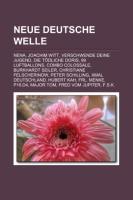- Start
- Neue Deutsche Welle
Neue Deutsche Welle
Angebote / Angebote:
Quelle: Wikipedia. Seiten: 148. Nicht dargestellt. Kapitel: Nena, Joachim Witt, Verschwende Deine Jugend, Die Tödliche Doris, 99 Luftballons, Combo Colossale, Burkhardt Seiler, Christiane Felscherinow, Peter Schilling, Xmal Deutschland, Hubert Kah, Frl. Menke, P16.d4, Major Tom, Fred Vom Jupiter, F.s.k., Von Bullerbü Nach Babylon, Ulrich Herter, Mark Eins, Andreas Dorau, Kurt Dahlke, Markus, Ixi, München - Reifenwechsel Leichtgemacht, Hans-A-Plast, Ralf Hertwig, Innovative Communication, Marie Deutschland, Detlef Diederichsen, Zaza, Tonträger 58, Goldener Reiter, Kosmonautentraum, Bodo Staiger, Vono. Auszug: Neue Deutsche Welle (New German Wave, often abbreviated NDW) was a genre of German music originally derived from punk rock and New Wave music. The term "Neue Deutsche Welle" was first coined by journalist Alfred Hilsberg, whose article about the movement titled "Neue Deutsche Welle - Aus grauer Städte Mauern" ("New German Wave - From Grey City Walls") was published in the German magazine Sounds in 1979. The history of the Neue Deutsche Welle consists of two major parts. From its beginnings to 1981, the Neue Deutsche Welle was mostly an underground movement with roots in British punk and New Wave music, it quickly developed into an original and distinct style, influenced in no small part by the different sound and rhythm of the German language which many of the bands had adapted from early on. The main centers of the NDW movement during these years were Berlin, Düsseldorf, Hamburg, Hannover and Hagen as well as, to a lesser extent, the Frankfurt Rhein-Main Region, Limburg an der Lahn and Vienna (Austria). From about 1980 on, the music industry began noticing the Neue Deutsche Welle, however, due to the idiosyncratic nature of the music, the focus shifted to creating new bands more compatible with the mainstream, rather than promoting existing bands. Many one-hit wonders and short-lived bands appeared and were forgotten again in rapid succession, and the overly broad application of the "NDW" label to these bands as well as to almost any German musicians not using English lyrics, even if their music was apparently not influenced at all by the 'original' NDW (including pure Rock bands like BAP or even Udo Lindenberg) quickly led to the decay of the entire genre when many of the original musicians turned their backs in frustration. Around 1983/1984, the era of the Neue Deutsche Welle came to an early end, following the oversaturation of the market with what was rarely perceived as stereotypical, manufactured hits. A revival of interest in the style in the Anglophone worl
Folgt in ca. 5 Arbeitstagen
